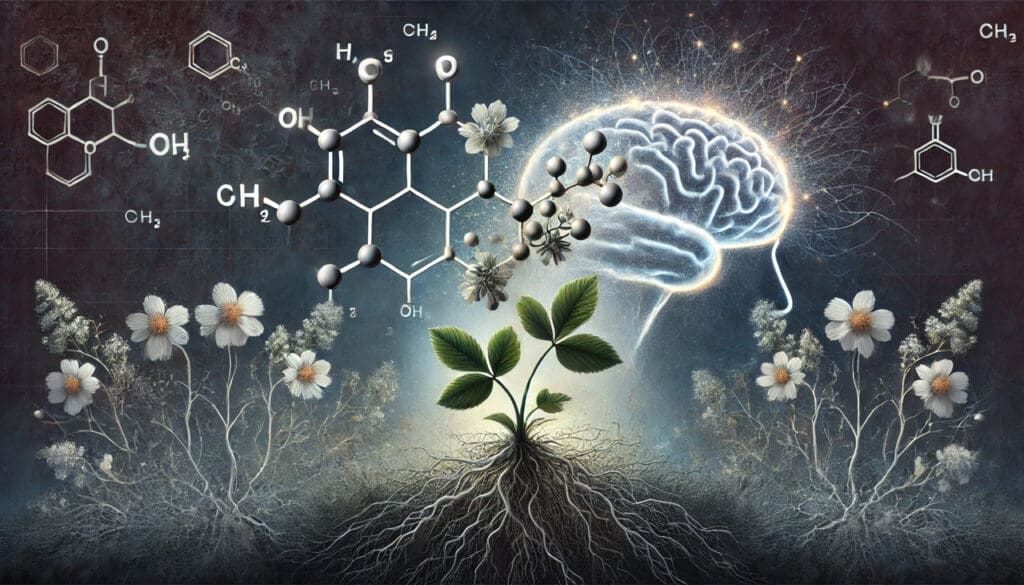Gravel root, scientifically known as Eupatorium purpureum, is a perennial herb that belongs to the Asteraceae family. Traditionally, it has been utilized in herbal medicine for its diuretic and anti-inflammatory properties. In recent years, gravel root has gained attention in the field of nootropics due to its potential cognitive-enhancing effects. This article delves into the chemistry, physiological mechanisms, potential nootropic benefits, dosage guidelines, side effects, drug interactions, and critical considerations for the safe use of gravel root as a supplement.
You May Also Like:
Sources of Gravel Root
Gravel root is native to North America, thriving in damp, low-lying areas such as wetlands, stream banks, and meadows. The aerial parts of the plant, including its flowers and leaves, are typically harvested for medicinal purposes. Traditionally, gravel root has been used in various herbal preparations to support kidney health and promote overall wellness.
It is important to note that the plant is often confused with other members of the Eupatorium genus, which can lead to misidentification. Thus, it is crucial for consumers to source gravel root from reputable suppliers who ensure the authenticity of the product. Gravel root is available in various formulations, including capsules, tinctures, and teas, allowing for flexible dosage options based on individual preferences and needs.
Boost Both Body Health and Mental Clarity with Gravel Root Supplements—Buy Now on Amazon!

Chemistry of Gravel Root
The therapeutic properties of gravel root can be attributed to several active compounds that are present in the plant. Key constituents include:
- Eupatorin: A flavonoid with notable anti-inflammatory and antioxidant effects. Eupatorin is known for its ability to scavenge free radicals and reduce oxidative stress, which may be beneficial for cognitive health.
- Saponins: These compounds possess diuretic properties that promote urine production and facilitate detoxification. Saponins are believed to influence gut health and enhance nutrient absorption.
- Alkaloids: Although present in smaller quantities, alkaloids may exert mild psychoactive effects that could contribute to cognitive enhancement. Some studies have indicated that certain alkaloids may have neuroprotective properties, aiding in the maintenance of cognitive function.
The chemical structure of eupatorin, for example, features hydroxyl groups that enhance its solubility in water, facilitating better absorption in the gastrointestinal tract. Saponins interact with cell membranes and may influence neurotransmitter signaling pathways, ultimately contributing to cognitive enhancement.

Physiological Mechanisms of Gravel Root in the Body and Brain
Gravel root’s physiological effects can be attributed to its active compounds, which engage multiple mechanisms in the body, particularly in the brain.
1. Diuretic Effects
Gravel root is traditionally recognized for its diuretic properties, which help flush excess fluids and toxins from the body. This action contributes to overall health and wellness, indirectly benefiting cognitive function by promoting a healthier internal environment. Proper kidney function is essential for maintaining electrolyte balance, and any disruption in this balance can negatively impact cognitive performance.
2. Anti-Inflammatory Properties
The anti-inflammatory effects of gravel root, primarily attributed to eupatorin, may provide neuroprotective benefits. Chronic inflammation in the brain is associated with cognitive decline and neurodegenerative diseases such as Alzheimer’s and Parkinson’s. By reducing inflammation and oxidative stress, gravel root may help maintain cognitive health and enhance neuroplasticity, which is critical for learning and memory.
3. Neurotransmitter Modulation
The alkaloids found in gravel root may influence neurotransmitter activity in the brain. This modulation is essential for maintaining mood and cognitive performance. For instance, by increasing serotonin levels, gravel root may help alleviate symptoms of anxiety and depression, leading to improved cognitive function. Dopamine, another critical neurotransmitter associated with reward and motivation, may also be positively influenced by the compounds in gravel root, enhancing focus and clarity.
Support Both Muscle Recovery and Mental Performance with Gravel Root—Order Now on Amazon!

Nootropic Benefits of Gravel Root
The exploration of gravel root as a nootropic supplement is still in its early stages, but several potential benefits warrant attention:
1. Enhanced Cognitive Function
Gravel root may enhance cognitive function through its antioxidant and anti-inflammatory properties. By creating a favorable environment for neuronal health, gravel root may improve memory, learning, and overall cognitive performance. Research suggests that maintaining low levels of inflammation and oxidative stress is crucial for optimal brain function, making gravel root a potential candidate for cognitive enhancement.
2. Mood Enhancement
The potential mood-enhancing effects of gravel root, possibly due to its influence on neurotransmitter levels, may benefit individuals experiencing mood disturbances. By promoting the synthesis of serotonin and dopamine, gravel root may help alleviate symptoms of anxiety and depression. Improved mood is directly correlated with better cognitive performance, as emotional well-being plays a vital role in how effectively we think and process information.
3. Increased Focus and Clarity
The diuretic and anti-inflammatory properties of gravel root may help improve focus and mental clarity. By reducing systemic inflammation and promoting detoxification, users may experience enhanced concentration and cognitive efficiency, particularly during demanding mental tasks. A clear mind is essential for productivity, and any substance that aids in achieving that state can be valuable for students, professionals, and anyone requiring sustained attention.
4. Stress Reduction and Adaptogenic Properties
Gravel root has been considered for its adaptogenic effects, which may help the body cope with stress. Adaptogens are substances that help stabilize physiological processes and promote homeostasis. Reduced stress levels can lead to improved cognitive performance, as chronic stress negatively impacts brain function and memory. By supporting the body’s stress response, gravel root may indirectly contribute to enhanced cognitive abilities.
5. Support for Gut-Brain Axis
Emerging research highlights the importance of the gut-brain axis in cognitive function. The saponins in gravel root may promote gut health, which is increasingly recognized as crucial for mental well-being. A healthy gut microbiome can positively influence mood and cognitive performance, making gravel root an intriguing candidate for those looking to enhance their cognitive function through gut health.

Dosage and Supplementation Guidelines
While there are no established dosage guidelines for gravel root as a nootropic, traditional herbal practices provide some insight into effective dosing.
1. General Dosage Recommendations
For general health and wellness, typical dosages of gravel root range from 500 mg to 1,000 mg per day, taken in divided doses. When used as a supplement for cognitive enhancement, individuals may consider starting with lower doses and gradually increasing to assess tolerance and effectiveness.
It is important to monitor how the body responds to gravel root, as individual responses can vary based on factors such as age, weight, and overall health.
2. Forms of Supplementation
Gravel root is available in various forms, including:
- Capsules/Tablets: These are convenient and easy to dose, making them popular among supplement users.
- Tinctures: Liquid extracts that allow for quick absorption. Tinctures may provide more immediate effects compared to capsules.
- Teas: Herbal infusions that provide a mild dose of the active ingredients. Tea can be a pleasant way to consume gravel root and may offer additional relaxation benefits.
Each form may have different bioavailability, with tinctures typically being absorbed more rapidly than capsules or teas.
3. Considerations for Use
Given the lack of comprehensive studies on gravel root’s long-term use, individuals should consult a healthcare professional before beginning supplementation, especially those with existing health conditions or those taking medications.
4. Combining with Other Nootropics
Some individuals may consider combining gravel root with other nootropic substances for enhanced cognitive benefits. However, it is crucial to consult with a healthcare professional before combining supplements, as interactions may occur. Popular nootropic stacks may include substances like L-theanine, Bacopa monnieri, or Rhodiola rosea, each known for their cognitive-enhancing properties.
Elevate Your Wellness Journey with Gravel Root for Body and Brain—Order Today on Amazon!

Side Effects and Safety
Gravel root is generally considered safe when used appropriately; however, potential side effects may arise:
1. Digestive Disturbances
Some individuals may experience gastrointestinal discomfort, including nausea or diarrhea, particularly when taking higher doses of gravel root. If any adverse effects occur, it is advisable to lower the dosage or discontinue use altogether.
2. Allergic Reactions
Though rare, allergic reactions to gravel root can occur, manifesting as rashes or itching. Individuals with known sensitivities to plants in the Asteraceae family, which includes ragweed and chrysanthemums, should exercise caution when considering gravel root.
3. Electrolyte Imbalance
As a diuretic, gravel root may lead to electrolyte imbalances if used excessively. This risk is particularly relevant for individuals who may already be prone to such imbalances due to underlying health conditions or other medications. Individuals using gravel root should monitor their hydration status and overall health, particularly if consuming other diuretics.
4. Potential Drug Interactions
Gravel root may interact with various medications, necessitating careful consideration. For example, its diuretic effects may amplify the action of prescription diuretics, leading to increased urine output and potential dehydration.
5. Effects on Blood Sugar
While there is limited research on gravel root’s effects on blood sugar, individuals with diabetes should be cautious when using this supplement. Monitoring blood sugar levels is crucial, especially when combining gravel root with other supplements or medications that may influence glucose metabolism.
Interactions with Other Supplements and Medications
Gravel root may interact with various supplements and medications, necessitating careful consideration:
1. Diuretics
Combining gravel root with prescription diuretics may amplify their effects, leading to increased urine output and potential dehydration. Individuals should consult their healthcare provider before combining these substances to ensure safety.
2. Blood Thinners
As some studies suggest that certain constituents of gravel root may exhibit mild anticoagulant effects, individuals taking blood-thinning medications, such as warfarin, should exercise caution and consult their healthcare provider.
3. Antidepressants and Anxiolytics
Given its potential influence on neurotransmitter levels, individuals taking antidepressants or anxiolytics should consult their healthcare provider before using gravel root to avoid unintended interactions.
4. Other Nootropic Supplements
Gravel root may be combined with other nootropic supplements, but caution is advised. Individuals should conduct thorough research on potential interactions and consult with a healthcare professional to ensure safe combinations.
Boost Overall Health and Cognitive Function with Gravel Root Supplements—Buy Now on Amazon!

Conclusion
Gravel root (Eupatorium purpureum) presents an intriguing potential for cognitive enhancement through its nootropic properties. With its diuretic, anti-inflammatory, and neuroprotective effects, gravel root may provide various benefits for cognitive function, mood enhancement, and stress reduction. However, thorough research is needed to establish comprehensive dosing guidelines and fully understand its safety profile.
Before beginning any supplementation, particularly for cognitive enhancement, it is crucial to consult with a healthcare professional to ensure that gravel root aligns with individual health needs and does not pose any risks. As the field of nootropics continues to evolve, gravel root may emerge as a valuable addition to the growing landscape of cognitive-enhancing supplements, provided it is used responsibly and with due consideration for individual health and safety.

References:
- Eupatorium purpureum – L. Retrieved from: https://pfaf.org/user/Plant.aspx?LatinName=Eupatorium+purpureum
- Eupatorium – An Overview. Retrieved from: https://www.sciencedirect.com/topics/biochemistry-genetics-and-molecular-biology/eupatorium
- The genus Eupatorium L. (Asteraceae): A review of their antimicrobial activity. Retrieved from: https://www.researchgate.net/publication/314086668_The_genus_Eupatorium_L_Asteraceae_A_review_of_their_antimicrobial_activity
- Antiinflammatory activity of the antirheumatic herbal drug, gravel root (Eupatorium purpureum): further biological activities and constituents. Retrieved from: https://pubmed.ncbi.nlm.nih.gov/11746861/
Important Note: The information contained in this article is for general informational purposes only, and should not be construed as health or medical advice, nor is it intended to diagnose, prevent, treat, or cure any disease or health condition. Before embarking on any diet, fitness regimen, or program of nutritional supplementation, it is advisable to consult your healthcare professional in order to determine its safety and probable efficacy in terms of your individual state of health.
Regarding Nutritional Supplements Or Other Non-Prescription Health Products: If any nutritional supplements or other non-prescription health products are mentioned in the foregoing article, any claims or statements made about them have not been evaluated by the U.S. Food and Drug Administration, and such nutritional supplements or other health products are not intended to diagnose, treat, cure, or prevent any disease.


